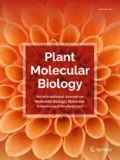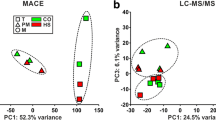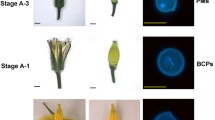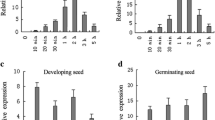Abstract
While a heat shock treatment of 40 °C or 45 °C induced the vegetative tissues of maize to produce the typical heat shock proteins (HSPs), germinating maize pollen exposed to the same temperatures did not synthesize these characteristic HSPs. Comparison of RNA accumulation in shoot and tassel tissue showed that mRNAs for HSP70 and HSP18 increased several-fold, reaching high levels within 1 or 2 hours. At the higher temperature of 45 °C these vegetative tissues were blocked in removal of an intron from the HSP70 mRNA precursor, which accumulated to a high level in tassel tissue. In germinating pollen exposed to heat shock, mRNAs for these HSPs were induced but accumulated only to low levels. The stressed pollen maintained high levels of RNA for α-tubulin, a representative normal transcript. It is likely that the defective heat shock response of maize pollen is due to inefficient induction of heat shock gene transcription.
Similar content being viewed by others
References
Atkinson BG, Liu L, Goping IS, Walden DB: Expression of the genes encoding hsp73, hsp18, and ubiquitin in radicles of heat-shocked maize seedlings. Genome 31: 698–704 (1989).
Bienz M: Developmental control of the heat shock response in Xenopus. Proc Natl Acad Sci USA 81: 3138–3142 (1984).
Bonner JJ, Parks C, Parker-Thornburg J, Mortin MA, Pelham HR: The use of promoter fusions in Drosophila genetics: Isolation of mutations affecting the heat shock response. Cell 37: 979–991 (1984).
Cooper P, Ho T-HD, Hauptmann RM: Tissue specificity of the heat-shock response in maize. Plant Physiol 75: 431–441 (1984).
Dietrich PS, Bouchard RA, Casey ES, Sinibaldi RM: Isolation and characterization of a small heat shock protein gene from maize. Plant Physiol 96: 1268–1276 (1991).
Dietrich PS, Bouchard RA, Sinibaldi RM: Isolation of maize 83, 70 and 18 kd heat shock genes. Abstract, 26th Annual Meeting of the American Society for Cell Biology, Washington DC, December 7–11 (1986).
Dupuis I, Dumas C: Influence of temperature stress on in vitro fertilization and heat shock protein synthesis in maize (Zea mays L.) reproductive tissues. Plant Physiol 94: 665–670 (1990).
Ehrenshaft M, Brambl R: Respiration and mitochondrial biogenesis in germinating embryos of maize. Plant Physiol 93: 295–304 (1990).
Feinberg AP, Vogelstein B: Addendum: A technique for radiolabeling DNA restriction endonuclease fragments to high specific activity. Anal Biochem 137: 266–267 (1984).
Frova C, Taramino G, Binelli G: Heat shock proteins during pollen development in maize. Dev Genet 10: 324–332 (1989).
Frova C, Taramino G, Ottaviano E: Sporophytic and gametophytic heat shock protein synthesis in Sorghum bicolor. Plant Sci 73: 35–44 (1991).
Herrero MP, Johnson RR: High temperature stress and pollen viability of maize. Crop Sci 20: 796–800 (1980).
Kimpel J, Key JL: Presence of heat shock mRNAs in field grown soybeans. Plant Physiol 79: 672–678 (1985).
Laemmli UK: Cleavage of structural proteins during the assembly of the head of bacteriophage T4. Nature 227: 680–685 (1970).
Lindquist S: The heat-shock response. Annu Rev Biochem 55: 1151–1191 (1986).
Lonnquist HH, Jugenheimer RW: Factors affecting the success of pollination in corn. J Am Soc Agron 35: 923–933 (1943).
Mascarenhas NT, Bashe D, Eisenberg A, Willing RP, Xiao C-M, Mascarenhas JP: Messenger RNAs in corn pollen and protein synthesis during germination and pollen tube growth. Theor Appl Genet 68: 323–326 (1984).
Plesofsky-Vig N; Brambl R: Two developmental stages of Neurospora crassa utilize similar mechanisms for responding to heat shock but contrasting mechanisms for recovery. Mol Cell Biol 7: 3041–3048 (1987).
Plesofsky-Vig N, Paulson A, Hill EP, Glaser L, Brambl R: Heat shock gene expression in germinating ascospores of Neurospora tetrasperma. FEMS Microbiol Lett 90: 117–122 (1992).
Rochester DE, Winter JA, Shah DM: The structure and expression of maize genes encoding the major heat shock protein, hsp70. EMBO J 5: 451–458 (1986).
Schoper JB, Lambert RJ, Vasilas BL, Westgate ME: Plant factors controlling seed set in maize. Plant Physiol 83: 121–125 (1987).
Spena A, Schell J: The expression of a heat-inducible chimeric gene in transgenic tobacco plants. Mol Gen Genet 206: 436–440 (1987).
Villemur R, Joyce CM, Haas NA, Goddard RH, Hussey PJ, Snustad DP, Silflow CD: The α-tubulin gene family of maize (Zea mays L.): evidence for two ancient α-tubulin genes in plants. J Mol Biol, in press.
Winter J, Wright R, Duck N, Gasser C, Fraley R, Shah D: The inhibition of petunia hsp70 mRNA processing during CdCl2 stress. Mol Gen Genet 211: 315–319 (1988).
Wood WI: Gene cloning based on long oligonucleotide probes. In: Berger SL, Kimmel AR (eds) Guide to Molecular Cloning Techniques, Methods in Enzymology, vol. 152, pp. 443–447. Academic Press, San Diego (1987).
Wu CH, Capar T, Browse J, Lindquist S, Somerville C: Characterization of an hsp70 cognate gene family in Arabidopsis. Plant Physiol 88: 731–740 (1988).
Xiao C-M, Mascarenhas JP: High temperature-induced thermotolerance in pollen tubes of Tradescantia and heat-shock proteins. Plant Physiol 78: 887–890 (1985).
Yost HJ, Lindquist S: RNA splicing is interrupted by heat shock and is rescued by heat shock protein synthesis. Cell 45: 185–193 (1986).
Zamir D, Tanksley SD, Jones RA: Haploid selection for low temperature tolerance of tomato pollen. Genetics 101: 129–137 (1982).
Author information
Authors and Affiliations
Rights and permissions
About this article
Cite this article
Hopf, N., Plesofsky-Vig, N. & Brambl, R. The heat shock response of pollen and other tissues of maize. Plant Mol Biol 19, 623–630 (1992). https://doi.org/10.1007/BF00026788
Received:
Accepted:
Issue Date:
DOI: https://doi.org/10.1007/BF00026788




